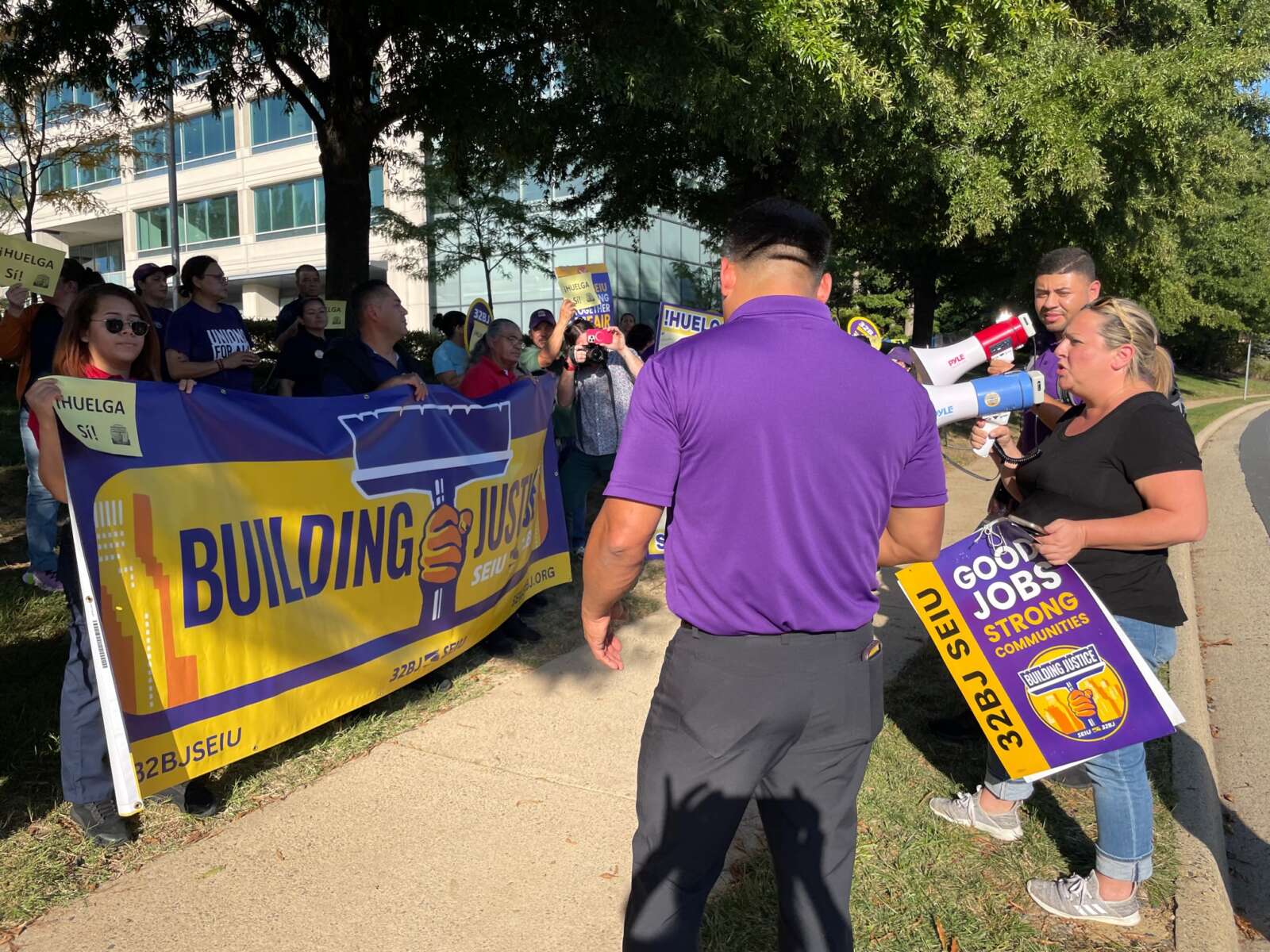
The workers who clean office buildings around Fairfax County won’t have to hit the picket lines anytime soon.
The union representing about 9,100 commercial office cleaners in the D.C. area reached a tentative agreement yesterday (Tuesday) for a new contract with property owners in the Washington Service Contractors Association (WSCA), averting a potential strike.
Expressing frustration with wages that haven’t kept up with the rising costs of food, rent and other basic needs, union members in Fairfax and Loudoun counties voted unanimously last week to authorize a strike if an agreement wasn’t reached by the time their existing contract expires on Sunday (Oct. 15).
“These men and women proved that collective action has the power to improve jobs and lives, just like other low-wage workers deserve nationwide,” said Jaime Contreras, executive vice president of 32BJ SEIU, the Service Employees International Union’s branch for the D.C. region.
Under the proposed contract, which will go to members for ratification next week, cleaners will get hourly wage increases of $3.55 to $3.75 over four years, according to the union. Pay currently ranges from $12.50 in Loudoun and Prince George’s counties — just over Virginia’s minimum wage — to $18.60.
The union’s 3,000-plus cleaners in Fairfax County, Arlington and Alexandria, who currently earn $15 an hour, will get the $3.55 raise, set to take effect in increments every July 1 through 2027, according to WSCA negotiator Peter Chatilovicz.
The larger increase of $3.75 will go to Loudoun and Prince George’s workers to keep them above the minimum wage, which will rise to $15 on Jan. 1, 2026.
The contract also preserves existing benefits for both full-time and part-time cleaners, per 32BJ SEIU:
Under the contract, janitors maintain access to free professional training and language courses as well as legal services for concerning issues such as immigration, family and matrimonial matters, and housing law among others. Full-time cleaners in all regions will maintain employer-paid health care, including prescription drugs, dental, vision and life insurance. Part-time cleaners will continue to receive life insurance and family dental benefits.
According to the union, the agreement was reached over seven bargaining sessions that started on June 22.
While pay was the primary point of contention, the union also took issue with a proposal that would’ve reduced shifts for new employees from five to four hours long. The suggestion was taken off the table last week, as local elected officials — including almost all Fairfax County supervisors — signed pledges and appeared at rallies in support of the cleaners.
A 32BJ spokesperson confirmed that the change in shifts was not part of the tentative agreement.
“I think it was a fair agreement for both sides,” Chatilovicz said. “We managed to, I think, give some very reasonable wage increases to the employees. Benefits all stayed the same without any further costs, and like I said, I think both sides were pleased to be able to reach an agreement before we had to worry about the contract expiration.”
The contract negotiations with the WSCA came amid a frenzy of labor actions across the country. While film and TV writers recently ended a nearly five-month strike, Hollywood actors and the United Auto Workers are still on the picket lines, and health care workers for Kaiser Permanente may walk off the job again in early November after a strike from Oct. 4-7 failed to produce an agreement.
Another strike may be on the horizon for the D.C. area, this time led by office cleaners who say wages have stagnated even after they were expected to keep working through the pandemic.
About 9,100 janitors, more than 3,000 of them in Northern Virginia, are voting this week on whether to go on strike if they’re unable to agree on a new contract with the Washington Service Contractors Association (WSCA) before the existing one expires on Oct. 15.
Cleaners employed in commercial buildings across Fairfax and Loudoun counties unanimously voted on Tuesday (Oct. 3) to authorize a strike, following the lead of their colleagues in D.C., who voted a day earlier, according to 32BJ SEIU, the Service Employees International Union’s branch for the D.C. region.
Coinciding with a three-day strike by Kaiser Permanente employees that’s reportedly the largest ever by U.S. health care workers, Baltimore area cleaners were set to vote yesterday (Wednesday), followed by Montgomery County workers today and Arlington County workers tomorrow.
“No one wants to strike, but we are ready to strike if employers keep pushing cuts that cleaners can’t afford,” 32BJ SEIU Executive Vice President Jaime Contreras said.
According to the union, a core sticking point in the contract negotiations, which began in June, has been a proposed reduction in shift lengths from five to four hours for about 1,100 cleaners — a third of the Northern Virginia workforce.
The change would amount to a 20% pay cut for the affected cleaners, who would have earn $100 less per week and have less time to do the same amount of work, the union says.
Peter Chatilovicz, the WSCA’s lead negotiator, told FFXnow yesterday that proposal has been taken off the table, noting that it would’ve primarily affected D.C. workers. The goal was “to provide flexibility to bring in new workers,” not cut wages for existing ones, as commercial property owners adapt to a challenging office market, he said.
The region has lost about 1,000 office janitorial jobs in recent years, according to 32BJ SEIU. A union spokesperson confirmed the shifts proposal was “verbally” withdrawn, but as of last night, nothing has been put on the record in writing.
The cleaners and WSCA last held contract negotiations four years ago, and there’s a “tentative agreement” for the next one to be the same length, extending to October 2027, Chatilovicz says. He’s “cautiously optimistic” that a deal will be reached in time, but the two groups are still split on pay.
“That’s the big issue right now is coming up with a wage compromise so that employees who are not the highest paid employees in the area or in America get a fair wage during this time, and so that we’re able to still be competitive and deal with the issues in the industry,” Chatilovicz said. “So, it’s a typical negotiation where we’re trying to exchange proposals and come up with a compromise that management can live with and the union is satisfied with.”
Under their current contract, Fairfax County cleaners earn $15 per hour, while Loudoun cleaners get $12.50 an hour. They also receive benefits like paid vacation, holidays and sick leave, health insurance if they work full-time and access to a training, education and legal services fund, per 32BJ SEIU.
While those rates exceed Virginia’s minimum wage, albeit just barely in Loudoun County, they’re not enough to match inflated prices and soaring rents, the union argues.
Alejandria Paz, a member of the union’s bargaining team who has worked as a cleaner at 1881 Campus Commons in Reston for over a decade, says she’s already struggling to keep up with the rising costs of food, rent, transportation and other necessities.
However, she also sees the prospect of reduced hours and pay as a frustrating reflection of how little attitudes toward cleaning staff have changed, despite the heightened attention to building cleanliness and ventilation brought by COVID-19. Read More
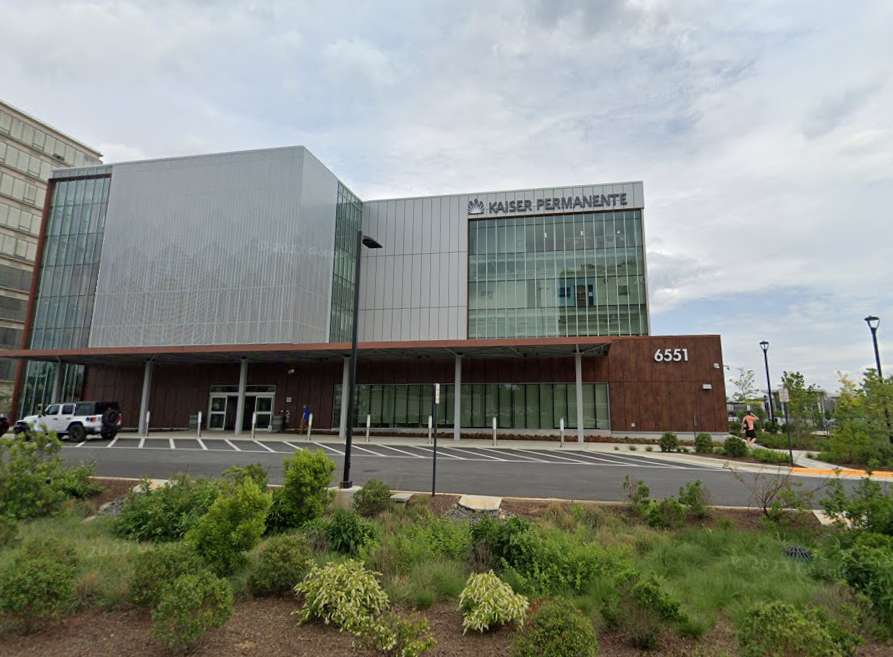
More than 75,000 workers at health care giant Kaiser Permanente are set to strike on Wednesday.
The Coalition of Kaiser Permanente Unions’ contract with the health system expired on Saturday night without reaching a new agreement with management. Union workers are bargaining for pay raises and increased protections against strain. Employees say they and patients are feeling the effects of short-staffing.
Kaiser Permanente has more than a dozen medical centers across the Washington, D.C., area with Fairfax County sites in Tysons, Reston, Fair Oaks, Burke and Springfield. The strike will take place over three days at hundreds of Kaiser Permanente facilities across Virginia, D.C, California, Colorado, Oregon and Washington, according to the unions.
“Kaiser continues to bargain in bad faith over these issues and, so far, there is no light at the end of the tunnel,” the unions said in a statement on Saturday.
Kaiser Permanente said that in Virginia and the District of Columbia, the strike covers less than 400 optometrists and pharmacists and does not include nurses or physicians. In the case of a strike, the health care provider expects facilities to remain open and operate with minimal disruption.
“We are continuing to bargain with the Coalition to reach a new agreement that protects and improves all the great advantages of working at Kaiser Permanente,” the health care provider said in a statement on Monday. “Our goal is to reach a fair and equitable agreement that strengthens our position as a best place to work and ensures that the high-quality care our members expect from us remains affordable and easy to access.”
If no contract agreement is reached by midnight, workers with union OPEIU Local 2 intend to picket Kaiser’s Springfield Medical Center at 6551 Loisdale Court tomorrow morning, DCist reported.
This article was written by FFXnow’s news partner InsideNoVa.com and republished with permission. It was lightly edited to focus on Fairfax County. Sign up for InsideNoVa.com’s free email subscription today.
Photo via Google Maps
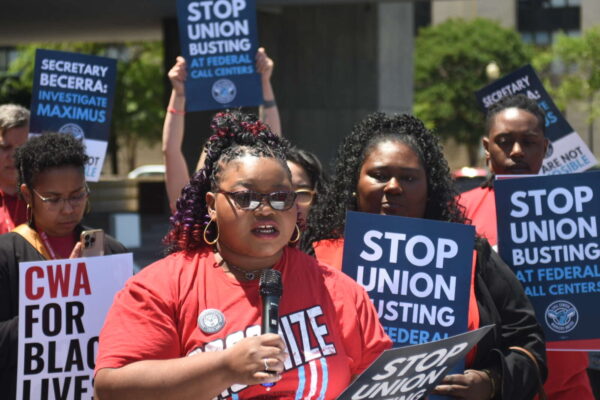
A union representing Maximus call center workers filed unfair labor practices charges against the Tysons-headquartered contractor this week.
In charges filed with the National Labor Relations Board (NLRB) on Tuesday and Wednesday (May 23 and 24), the Communications Workers of America alleges that the government services company, which operates call centers for Medicaid and Medicare, has retaliated against employees and illegally tried to discourage them from unionizing.
The CWA says it filed the complaints because Maximus is laying off more than 700 call center workers this month who handle customer service for the Centers for Medicare and Medicaid Services (CMS) and the Centers for Disease Control (CDC).
At a protest organized by Call Center Workers United, which is part of the CWA, a worker who handled calls for the CDC for three years said yesterday (Thursday) that he was laid off two days before Mother’s Day despite having a “great performance record with no discipline.”
“I believe the real reason I was laid off was in retaliation for speaking out about Maximus’ working conditions, and to scare my co-workers from supporting a union. But we have a right to speak out and tell the truth, and to organize to improve our working conditions,” Daija Arrington said at the rally in D.C. outside the Department of Health and Human Services, which operates both CMS and the CDC.
The layoffs are happening less than 2 months before Maximus usually starts its annual recruitment blitz
in July🤔🤔🤔 pic.twitter.com/ZtUCGQGQmd— Call Center Workers United (@CCWUnited) May 23, 2023
According to the charge sheet, Maximus violated federal labor laws in April and May by retaliating against employees involved in union activities by laying them off, threatening them with layoffs or worksite closures and offering severance agreements with conditions limiting their ability to talk about their experiences with the company.
The CWA also alleges that Maximus made “implied promises of benefits” to employees and forced them to attend a meeting to discourage them from unionizing.
Though the charge is tied to a call center in Hattiesburg, Mississippi, which has served as an organizing base for the union, the recent layoffs have affected employees across the company’s 10 centers, most of which are in the South, according to the CWA.
Another 143 workers at the Hattiesburg call center were reportedly laid off in January.
When contacted for comment by FFXnow, Maximus said that “the allegations were just made available to us,” but it is “confident that the company complied with all applicable labor requirements.”
“Given the lack of specific detail, including dates of alleged occurrence and names of workers, we are unable to respond directly to the allegations,” Maximus said in a statement. “We pride ourselves in complying with applicable labor laws across all our operations and will cooperate fully with any request from the National Labor Relations Board.” Read More
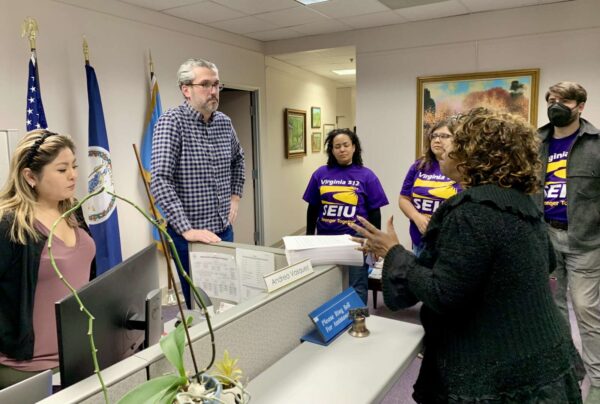
With over $110 million in unallocated funds to work with, the Fairfax County Board of Supervisors moved yesterday (Tuesday) to address employee compensation, tax relief and other priorities.
As approved by the board 9-1, nearly all of that available money will go toward reducing the real estate tax rate by 1.5 cents and fully funding salary market rate adjustments for county employees — items totaling $47 million and $54.9 million, respectively.
Other revisions to the county’s advertised budget for fiscal year 2024 include support for bamboo removal on park land, additional staffing for the 24-hour domestic violence hotline, and the creation of a self-help legal center in the Fairfax County Courthouse.
“The adjustments I’ve outlined here show a true balance between tax relief, investing in county employees, standing up and fighting for our school system, and also making sure that the core services that have made this county…are supported in this budget,” Board of Supervisors Chairman Jeff McKay said when introducing the mark-up package.
The budget proposal that County Executive Bryan Hill presented in February kept the county’s real estate tax rate flat at $1.11 per $100 of assessed value, but with the average residential bill calculated to increase by about $520, board members indicated that they would look for ways to cut the rate.
With yesterday’s vote, the board agreed to adopt a rate of $1.095 per $100 of value, which will lower the average increase to $412.
Herrity proposes cuts to schools budget
Several supervisors expressed disappointment at not being able to make a bigger cut. Mason District Supervisor Penny Gross stated she had hoped for a 3-cent reduction, and Springfield District Supervisor Pat Herrity proposed an “alternative” budget that he said would take five cents off.
The reduction would’ve been achieved by cutting $100 million from the county’s funding for Fairfax County Public Schools and putting $31 million for affordable housing on hold, among other cuts, according to a plan Herrity shared at a pre-mark-up session on Friday (April 28).
After FCPS told the board in a memo that Herrity’s proposal would “most definitely” prevent the school system from fully covering worker salary increases, he revised the proposal yesterday to suggest cutting $31 million from schools, taking one additional cent off the tax rate.
“I’m all for giving schools all the resources they need to address the challenges of the pandemic and challenges of our kids, but the spending needs to be done in a responsible way,” Herrity said.
Other supervisors blasted Herrity’s proposal as “budgeting by ambush” and “completely out-of-touch.” McKay noted that any reduction in salary increases for teachers would mean losing state money contingent on average raises of at least 2.5% for instructional positions in FY 2024, which begins July 1.
“The Herrity budget proposal doesn’t cut waste,” Braddock District Supervisor James Walkinshaw said. “I think you were trying to find waste. Instead of waste, you found teacher salaries and textbooks. It’s not cutting fat from the FCPS budget, it’s cutting into the bone.”
Support for FCPS constitutes 52% of Hill’s proposed $5.1 billion budget, which includes a $144 million increase for the school system compared to last year. Read More

An IT contractor headquartered in Reston’s South Lakes area has agreed to pay over $435,000 to settle a federal investigation that found racial discrimination in its hiring practices.
Intelligent Waves LLC allegedly engaged in “systemic hiring discrimination” against 14 Black applicants who sought work in Arizona and Nevada as test instrumentation technicians, the Department of Labor’s Office of Federal Contract Compliance Programs (OFCCP) announced Friday (April 21).
The allegations were raised by a “routine” compliance investigation that took place between Nov. 5, 2019 and Aug. 31, 2021, according to a news release.
Investigators found violations of Executive Order 11246, which prohibits discrimination by federal contractors, by personnel at the company’s Reston headquarters (1801 Robert Fulton Drive, Suite 440) who were responsible for filling the technician positions.
“OFCCP identified a statistically significant disparity (equivalent to a shortfall of five (5)), not otherwise explained, in the hiring of Black Test Instrumentation Technician applicants on the basis of their race,” the office says in the compliance agreement.
The OFCCP also found that Intelligent Waves failed to preserve accurate employment records and implement an audit system to monitor the effectiveness of its affirmative action program during the investigation period, according to the agreement.
“Our settlement with Intelligent Waves reflects our commitment to preventing hiring discrimination and holding federal contractors accountable when they fail to ensure equal employment opportunity,” Office of Federal Contract Compliance Programs Mid-Atlantic Regional Director Sam Maiden said.
Launched in 2006, Intelligent Waves provides cybersecurity, data science, network & systems engineering and software development services. Its clients include the Air Force, NASA, the Department of Veterans Affairs and the General Services Administration, according to the labor department.
Per the compliance agreement, the company “neither admits nor denies” any violations of the federal government’s nondiscrimination rules.
According to Intelligent Waves, the discrimination allegations stem from “a single position and an incident that transpired almost three years ago, resulting from a record-keeping error when Intelligent Waves was a small business.”
The company says it hasn’t employed the people involved since 2022 and started “implementing measures” to ensure compliance with federal rules as soon as it became aware of the error.
“Intelligent Waves has a long history of providing an equitable and inclusive workplace for all employees, exceeding industry averages for diversity and veteran employment, and has maintained a strong anti-discrimination policy since its founding,” Intelligent Waves said in a statement, noting that it was listed among the D.C. area’s top corporate diversity employers last year by the Washington Business Journal.
However, as part of the settlement, Intelligent Waves has agreed to not only provide $435,368 in back pay and interest to the 14 affected individuals, but also give them priority for a job offer if there are future test instrumentation technician vacancies.
The contractor is also required to evaluate its hiring policies and procedures for the position and train employees involved in hiring on any changes.
All of the settlement funds must be distributed by Feb. 20, 2024, and the company must give the OFCCP a progress report on its hiring practices by April 1, 2024, per a timeline in the agreement. The office has a Class Member Locator with information for anyone who thinks they’re eligible for relief.
Photo via Cytonn Photography/Unsplash
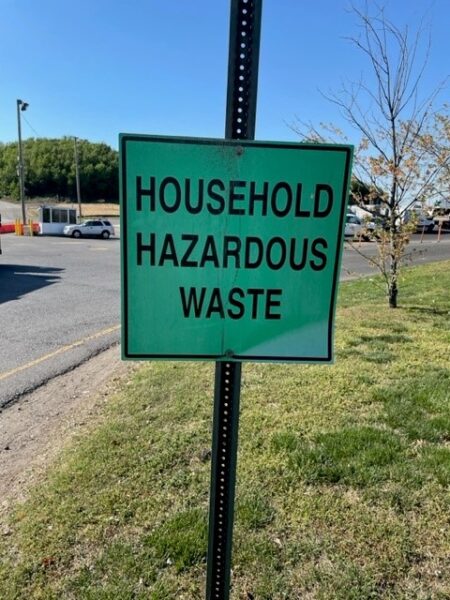
Fairfax County is reducing the hours for some waste collection services at the I-66 Transfer Station (4618 West Ox Road) and I-95 Landfill Complex (9850 Furnace Road).
Beginning May 1, the facilities will reduce hours for dropping off household hazardous waste (HHW) and electronics waste. The changes are ushered in by staffing shortages and are intended to maintain a “consistent quality service,” according to the county.
Currently, four of the seven total positions for environmental technology are vacant — positions that are hard to fill internally and externally, says Sharon North, a spokesperson for the county’s Department of Public Works and Environmental Services (DPWES).
“They require specific training and knowledge to work with such materials, per federal and state regulation,” North told FFXnow. “The training is focused on packaging, labeling, and marking shipping containers and drums, as well as basic knowledge of chemical, environmental and health hazards, plus hazardous waste emergency response methods, procedures and regulations.”
Private contractors that the county typically relies on to supply field chemists and other staff have also been hit by similar labor problems.
“These challenges are not unlike what we are seeing throughout our DPWES operations with regard to frontline field personnel,” North said. “The most challenging positions are drivers, operators, technicians, maintenance and trades personnel, safety specialists and general labor.”
A breakdown of the new hours is below:
*The new I-66 HHW drop-off hours will be:
Monday and Friday: 7 a.m. to 5 p.m.
Tuesday and Thursday: noon to 5 p.m.
Saturday and Sunday: 7 a.m. to 4 p.m.
*There are no HHW drop-offs hours on Wednesday.*The new I-95 HHW drop-off hours will be:
Wednesday: 7 a.m. to 5 p.m.
Saturday: 7 a.m. to 4 p.m.*There are no HHW drop-offs hours on Monday, Tuesday, Thursday, Friday or Sunday.
*The new I-66 electronics waste drop-off hours will be:
Monday: 7 a.m. to 5 p.m.
Tuesday: noon to 5 p.m. (half day)Thursday: noon to 5 p.m. (half day)
Friday: 7 a.m. to 5 p.m.
Saturday and Sunday: 7 a.m. to 4 p.m.*There are no electronics drop-off hours on Wednesday.
*The new I-95 electronics drop-off hours will be:
Wednesday: 7 a.m. to 5 p.m.
Saturday: 7 a.m. to 4 p.m.*There are no electronics drop-off hours on Monday, Tuesday, Thursday, Friday or Sunday
Local union members protested in front of the Kingstowne Safeway yesterday (Wednesday) in opposition to the proposed merger between grocery store conglomerates Kroger and Albertsons.
About 30 members of United Food and Commercial Workers (UFCW) Local 400 marched near the front door of the Safeway at 5980 Kingstowne Towne Center. The local protest was part of a nationwide day action from a coalition of organizations hoping to stop Albertsons, which owns Safeway, from merging with Kroger, which owns Harris Teeter.
A protest was also held at a Safeway (1100 4th Street SW) in D.C.
“[The merger is] not only going to affect the stores and not only the workers at those stores and not only the customers of those stores, but this merger has the potential to impact everyone who shops for groceries in America,” UFCW Local 400 spokesperson Jonathan Williams told FFXnow. “It’s going to completely shift the grocery retail landscape and we think for the worse.”
The protest was to draw attention to the potential downsides of the merger, ask the public to pressure the Federal Trade Commission to not approve it, and to distribute free, reusable grocery bags.
The merger could mean increased food costs, fewer options, and lower sale prices for farmers, critics say.
The $25 billion agreement to merge the country’s two largest grocery store chains was first announced last October. The timeline for when the deal will be approved — or rejected — is not immediately clear, but it was reported earlier this year that it could be a long process.
UFCW Local 400 represents 21,000 food workers across the Mid-Atlantic region. While Williams didn’t know the exact number of Safeway and Harris Teeter workers represented, both stores have numerous locations in Fairfax County.
If the merger goes through, it could lead to closures and increased unemployment regionally, according to Williams.
“In Northern Virginia…if you look at a map of Safeway stores and Kroger-owned Harris Teeter, they are often in close proximity to one another,” he said. “As a result of antitrust regulations as well as efficiency, it’s unlikely for a merged company to operate both stores. What sense does it make to have a grocery store across the street from your other grocery store? So, we were worried about store closures.”
FFXnow has reached out to both Safeway and Harris Teeter representatives for comments on the protests and the merger, but has yet to hear back as of publication.
Despite nearly $25 billion being on the line, Williams expressed some hope that the merger could be stopped. He saw the Senate grill grocery store leadership late last year and believes there’s some momentum for the FTC to reject the deal.
“Unlike in years past, where these mergers are something of a formality on the Hill…there is a lof skepticism that this deal will be approved,” he said. “We are certainly more hopeful than we have been in years past.”
Williams and the rest of UFCW Local 400 hope protests like the one in front of the Kingstowne Safeway will encourage the public to advocate against the merger to the FTC and local lawmakers.
“We’re not talking about Taylor Swift tickets and Ticketmaster here. We’re talking about bread, butter and milk,” said Williams. “And we can’t allow any kind of monopoly in the food system.”
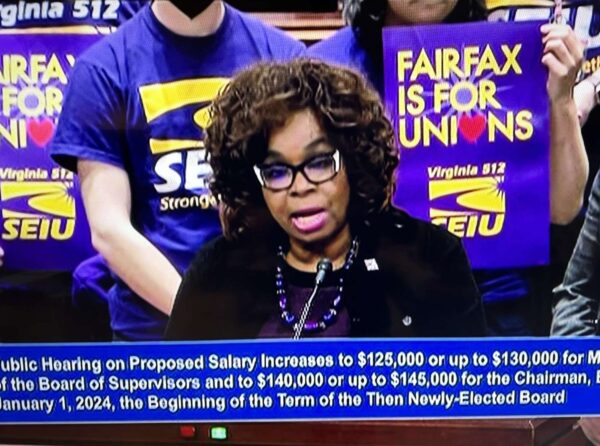
The Fairfax County Board of Supervisors will get its first salary increase in eight years, starting next January.
The current board voted 8-2 last night (Tuesday) to raise the pay to $123,283 for a supervisor position and to $138,283 for the chairman — slightly lower than the ranges that were proposed on March 7.
Based on staff calculations, the approved increase for board members is in line with what general county employees received, on average, in merit and market rate adjustments since the board last got a raise in 2015, according to Dranesville District Supervisor John Foust.
“Supervisor compensation should be set at a level that would enable anyone to serve regardless of personal circumstances. To advance that goal, I think, is appropriate,” Foust said before putting the motion up for a vote.
The vote came after a public hearing that lasted over two hours, with some speakers becoming emotional as they shared stories of how they’ve struggled with the area’s rising cost-of-living or how employee vacancies and hiring challenges have affected county services, from parks to support for foster care families.
Aside from one Braddock District resident who suggested they would “not be out of line,” considering inflation over the past eight years, all the speakers voiced opposition to the originally proposed raises that could’ve increased supervisor salaries up to $130,000 and the chairman’s up to $145,000.
“Too many are just getting by, and others are on the verge of falling into crisis,” Carolyn Bivens said. “Respectfully, in my opinion, the case has not been made for making the Board of Supervisors positions full time. More importantly, a 35 to 45% increase would be viewed as tone-deaf in this environment.”
Some said they support the board getting pay raises, but the amounts advertised were “insulting” when the county is only proposing 2% market rate adjustments for workers in its next budget, rather than the 5% that was forecast.
Other jurisdictions in Virginia are advertising MRA increases of up to 6-9%, according to Fairfax Workers Coalition Executive Director David Lyons.
He acknowledged that Virginia law requires a different process for adjusting the compensation of elected officials than for other public employees, but the proposal created a perception “that you care more about yourselves than you do your workers.”
“What we do have is a shortage of human service workers. We have a shortage of cops. We have a shortage in solid waste collection that is causing the county to contract out good jobs,” he said. “And in the case of all these jobs, citizens will suffer as the vacancies grow, as the quality drops and as real experience keeps going out the door. That’s why this proposal struck people as wrong.” Read More
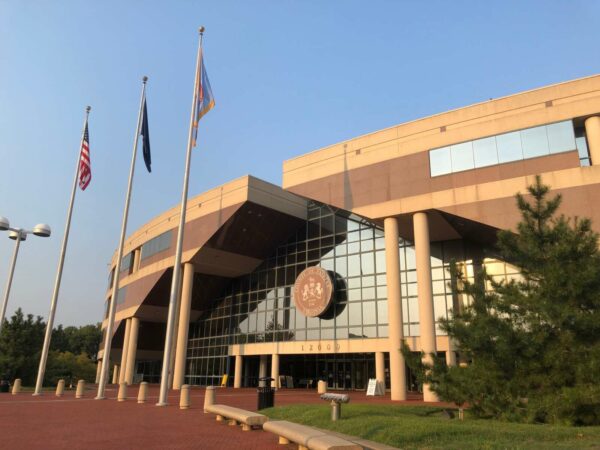
The Fairfax County Board of Supervisors isn’t holding a public hearing on its proposed salary increases until Tuesday (March 21), but some county workers have already made their opposition known.
A union representing over 2,000 county government employees criticized the proposal as a blow to workers, whose projected pay raises aren’t expected to be fully funded in the county’s next budget.
“Despite our calls for wage fairness for county employees, it appears the County has another priority — raises for politicians,” SEIU Virginia 512 Fairfax President Tammie Wondong said. “A meager 2% raise combined with the crushing weight of wage compression has left us feeling devalued. When employees have to work multiple jobs to get by or can’t afford to live in the county, it’s clear change is needed.”
With 33 years of work for the county under her belt, Wondong says the disparity between what the board is considering for itself compared to employees illustrates the need for “a union contract to achieve pay fairness.”
The Board of Supervisors approved collective bargaining in October 2021, but the Fire and Rescue Department is the only unit to officially elect a union representative so far.
Put forward by Dranesville District Supervisor John Foust on March 7, the raises would push the salaries for board members up from $95,000 to $124,000-130,000 per year and from $100,000 to $140,000-145,000 a year for the board chair.
The high end of those ranges would amount to pay bumps of nearly 37% for supervisors and 45% for the chair. Both positions last got raises in 2015.
Foust, who’s retiring at the end of December, says higher compensation will encourage candidates to run for supervisor, a position that carries full-time commitments but is treated as a part-time job in Virginia.
As I leave, I know it is critically important that we continue to attract great candidates from all backgrounds and stages of life to serve on the Board. The opportunity to serve is itself very rewarding. However, I believe it is in the best interest of the County that Supervisor compensation be set at a level that will enable anyone to serve regardless of their personal circumstances, and not just those who are wealthy or have other sources of income. I believe that increasing Supervisor pay for the first time in 8 years will advance that goal. I recognize that others have raised concerns and I look forward to the public hearing that will be held on March 21.
“I hope that through my service I have demonstrated that I care very much about the residents and employees of Fairfax County,” he said in a statement to FFXnow.
However, the challenge of affording housing, child care and other living expenses that some supervisors mentioned during their March 7 meeting also poses an obstacle to other county workers, like teachers and police, Fairfax County Federation of Teachers President David Walrod said.
About 1 in 7 Fairfax County employees can’t afford to live where they work, according to a 2021 analysis by The Commonwealth Institute for Fiscal Analysis (TCI), a Richmond-based think tank. Read More

